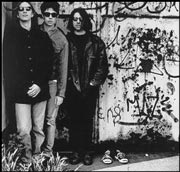ECHO AND THE BUNNYMEN
Showbox, 628-3151, $20 adv. 8 p.m. Wed., July 25
OF ALL THE OLD-GUARD British modern rockers, Echo and the Bunnymen always seemed the least likely candidate for peaceful retirement. At the close of the 1980s, while contemporaries like the Cure and Siouxsie and the Banshees rallied behind some of the best albums of their careers, Bunnymen vocalist Ian McCulloch and guitarist Will Sergeant were busying themselves with a vicious feud. Epithets were hurled, feelings were trampled, and it culminated in an unnerving silence. When McCulloch left for a solo career in 1988 and Sergeant carried on under the Bunnymen name for one poorly received record, people didn’t bother speculating on a reunion; instead, they took bets on which former Bunnyman would punch out the other first.
Fast-forward to the present, however, and the scene is quite different. Five years ago, McCulloch and Sergeant joined with original bassist Les Pattison and resurrected Echo and the Bunnymen. Since then, the band have carried on peacefully, without publicized hostility (even after Pattison’s departure in 1999). After three records—including the 1997 comeback, Evergreen (London), 1999’s What Are You Going to Do With Your Life? (London), and this year’s Flowers (SpinART/Cooking Vinyl)—Sergeant and McCulloch have apparently found common ground.
Speaking from his home in Southport, England, Sergeant laughs when asked about the current state of his relationship with McCulloch: “We’re sort of on and off, like,” he admits. “There was a period where we hated each other’s guts. But now it’s OK. Everything’s all right. We give it a lot of space.”
Describing these two explosive souls as “friends” might not be accurate, but it is true that Sergeant and McCulloch are no longer the impetuous Bunnymen of yore. Older and wiser, though not necessarily more sober, this pair have somehow managed to pull off the transition that plagues other aging rock stars—the successful trade of angst for complacency.
The shift in attitude definitely makes its presence known on Flowers. Where definitive Bunnymen albums like Ocean Rain and Crocodiles existed in a series of manic peaks and depressive valleys, Flowers‘ moods are consistent, with personal musings on love and death, fame and fortune. And though the lyrical content is tamer and less fantastical than in the past, McCulloch’s husky voice still sounds rich and intense. On the album’s closer, “Burn for Me,” it lies stripped to its bleeding, raw edges as he repeats the phrase, “I’m going out,” into a slow fade.
Musically, the instrumentation is darker and edgier than the tepid pop that appeared on What Are You Going to Do With Your Life?—a change for which Sergeant is extremely grateful. “It’s no secret that I don’t like that album,” he explains. “It was a bit forced out—like we were some sort of pop band.”
He pauses, then adds, “It was the worst experience that I’ve had in my life. I had to fight to put anything on it!”
Indeed, Flowers might slide in place behind other Bunnymen blunders were it not for the return of Sergeant’s guitar. Tracks like “Hide and Seek” and “Everybody Knows” give him space to stretch out into his trademark searing melody lines, adding a breadth to the music that has been sorely absent. The addition of a trio of young players—bassist Alex Germains, drummer Vincent Jamieson, and keyboardist Ceri James—has also lent vibrancy to the sound. “They’re still into music,” Sergeant notes. “Session men, they’re not really into music. They’re into money.”
Admittedly, it is tempting to dismiss the entire Bunnymen reunion as a bank account-padding venture. But McCulloch and Sergeant’s actions suggest otherwise. In support of Flowers, the band are embarking on an extensive tour that includes Australia, Japan, the U.S., and the U.K. McCulloch is recording a third solo album for Jeepster Records, with longtime collaborator Ian Broudie at the helm, and Sergeant has been exploring electronic music with a side project called Glide. In addition, Rhino has just released Crystal Days 1979-1999, a four-disc box set of Echo’s singles, B-sides, and unreleased live material.
If there is one thing this thorny pair have realized, it is that being an aging rock band means keeping a steady, comfortable pace. After the pinnacle that was Ocean Rain, Echo and the Bunnymen may never craft another truly essential album. Flowers at least re-establishes them as a band that will do anything but go out with their heads hung in shame.
“I’d love to be in a position like the Doors, where we attract new people because we do good music,” Sergeant concludes. “That’s where I really want to be.”








